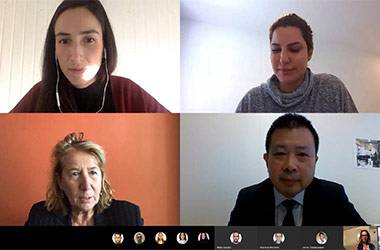Wittenborg Online News!
Using the Natural Rhythms of a City to Make You Safer
Using the Natural Rhythms of a City to Make You Safer
MBA Students at Wittenborg Amsterdam Get Insight on Unique Research Model Involving Students and Officials from 6 Cities
MBA students at Wittenborg Amsterdam were recently treated to a seminar by Prof. Caroline Nevejan, chief science officer of the City of Amsterdam, who came to talk about City Rhythm - a project initiated by her where city dwellers' daily rituals are observed and the data then used to enhance social security. "Rhythms in a city are very important – people often let their dogs out at the same time, bring their children to school at the same time, sit in the same bus every day or do their shopping at the same intervals. This creates a certain cohesion, and I wanted to do something with that. Which is why I presented my ideas to local governments and they agreed that this rhythm can be used to enhance security," Nevejan told VNG Magazine.
What made the project special was that officials, students, researchers and artists from 6 different cities worked on it as a new model to formulate local government policies. The participating cities are Amsterdam, Helmond, The Hague, Rotterdam, Zaanstad and Zoetermeer.
Nevejan came to speak with Wittenborg students about the methodology that was designed and employed to make the study work. Senior lecturer and Education Administrator at Wittenborg Amsterdam, Dr Dadi Chen, said the seminar gave a lot of inspiration to students about how social research questions can be approached from different perspectives.
"The main methodology they used was the intervention cycle of the minor, Responsible Innovation. The steps they covered were Problem Identification, Problem Analysis, Problem Definition, Solution Re-Design, Solution Implementation, and Solution Evaluation. The activities in these steps varied from workshops with civil servants to spatial analysis and making of personas. Based on this, they developed their own City Rhythm Methodology," Chan said.
In a foreword to the logbook of the study, Rabin Baldewsingh, alderman of The Hague city council, writes: "Many large cities explore possibilities for enhancing social safety. Municipalities invest in local police and in surveillance, yet they realise that social safety is also the result of interaction between people. However, in many cities relations between people are anonymous and flexible. People easily move and do not engage with each other. As a result people feel less safe, even when figures on crime decrease."
Nevejan is professor by special appointment of Designing Urban Experience at the University of Amsterdam. At the City of Amsterdam she is responsible for research, science, and knowledge development.
WUP 29/10/2020
by Anesca Smith
©WUAS Press
447 words
